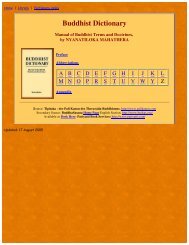With my respects to the Venerable Nyanatusita Thera
With my respects to the Venerable Nyanatusita Thera
With my respects to the Venerable Nyanatusita Thera
Create successful ePaper yourself
Turn your PDF publications into a flip-book with our unique Google optimized e-Paper software.
The Buddha's doctrine, as Manmatha Nath Shastri puts it, is “<strong>the</strong> glory of India andIndians.” 3 <strong>With</strong>out it, Indian culture would be a maimed thing. And <strong>the</strong> Land of <strong>the</strong>Purple Fruit, Jambudvipa, would for <strong>the</strong> world lose most of its sanctity and interest, if<strong>the</strong> Blessed One, <strong>the</strong> Buddha, had not walked in <strong>the</strong> Middle Country, Madhyadesa, ashe did for forty-five years enfolding all within <strong>the</strong> aura of his compassion, and blazing<strong>the</strong> path of true renunciation. Realizing <strong>the</strong> significance of that ministry of <strong>the</strong> Master, C.V. Raman said, “In <strong>the</strong> vicinity of Benares, <strong>the</strong>re exists a path which is for me <strong>the</strong> mostsacred place in India. This path was one day travelled over by <strong>the</strong> Prince Siddhartha,after he had gotten rid of all his worldly possessions in order <strong>to</strong> go through <strong>the</strong> worldand proclaim The Annunciation of Love.” 4Again, it is <strong>the</strong> Master of Merciful Wisdom, and his love-gift of liberation for all thatbrea<strong>the</strong>s, that grip <strong>the</strong> imagination of Edwin Arnold at Benares, <strong>the</strong> citadel of modernHinduism, steeped though he is in <strong>the</strong> knowledge of <strong>the</strong> Gìta and in Vedic lore: “… it isnot Hinduism which—<strong>to</strong> <strong>my</strong> mind at least—chiefly consecrates Benares. The divinememory of <strong>the</strong> founder of Buddhism broods over all <strong>the</strong> country hereabouts; and just as<strong>the</strong> walls and buildings of `Kasi' are full of old Buddhist s<strong>to</strong>nes carved with symbols andlegends of his gentle faith, so is <strong>the</strong> land north and south famous with <strong>the</strong> passage of hisfeet, and so are <strong>the</strong> religious and social thoughts and ways of all this Hindu peoplestamped with <strong>the</strong> impress of his doctrines. Modern Brahmanism is really Buddhism in aShastri's robe and sacred thread. Shunkuracharya and his priests expelled <strong>the</strong> brethrenof <strong>the</strong> yellow robe from India, but <strong>the</strong> spirit of Sakya-Muni's teaching remainedunbanished, just as `Greece, overcome, conquered her conqueror.'” 5It is impossible <strong>to</strong> overrate <strong>the</strong> importance of <strong>the</strong> work done by Buddhism for India, or,for that matter, for <strong>the</strong> world. They say that Buddhism has ceased <strong>to</strong> exist just in <strong>the</strong>country where it sprang up. Nothing, however, is more untrue, 6 according <strong>to</strong> D. R.Bhandarkar.Many revealing statements of <strong>the</strong> above-mentioned sort could be cited from <strong>the</strong> writingsboth of Indians and non-Indians of note <strong>to</strong> support <strong>the</strong> contention that India is inwardlyBuddhist, whatever its outer religious labels be. And labels are unimportant where ateaching like Buddhism is concerned. To <strong>the</strong> Buddha and his followers names do notmatter much: “What's in a name?…”The main thing in Buddhism is its germinal power which, penetrating silently,unhurriedly, imperceptibly in<strong>to</strong> <strong>the</strong> womb of <strong>the</strong> spirit, produces <strong>the</strong> embryo of <strong>the</strong>compassionate view, <strong>the</strong> vision of life as something in urgent need of salvation from <strong>the</strong>perils that beset it. And with <strong>the</strong> development of that wisdom-view and its birth as acomplete idea, is brought home <strong>to</strong> <strong>the</strong> real thinker <strong>the</strong> urgency <strong>to</strong>o of a rational, practicaland sane method of deliverance from all dissatisfactions, first through ameliorative3 Shastri, Manmatha Nath, Buddha: His Life, His Teachings, His Order: Toge<strong>the</strong>r with The His<strong>to</strong>ry OfThe Buddhism, Society for <strong>the</strong> Resuscitation of Indian Literature, Calcutta, 1910, p.ii4 The Bosat, Vol. 5, No. 1, 1942, Vajirarama, Colombo, p. 85 Arnold, Edwin, India Revisited, Second Edition, London, 1891, p. 2236 The Bosat, Wesak, 1940, Vajirarama, Colombo, p. 952
















